Published Oct 14, 2024 | 3:58 PM ⚊ Updated Oct 15, 2024 | 7:56 PM
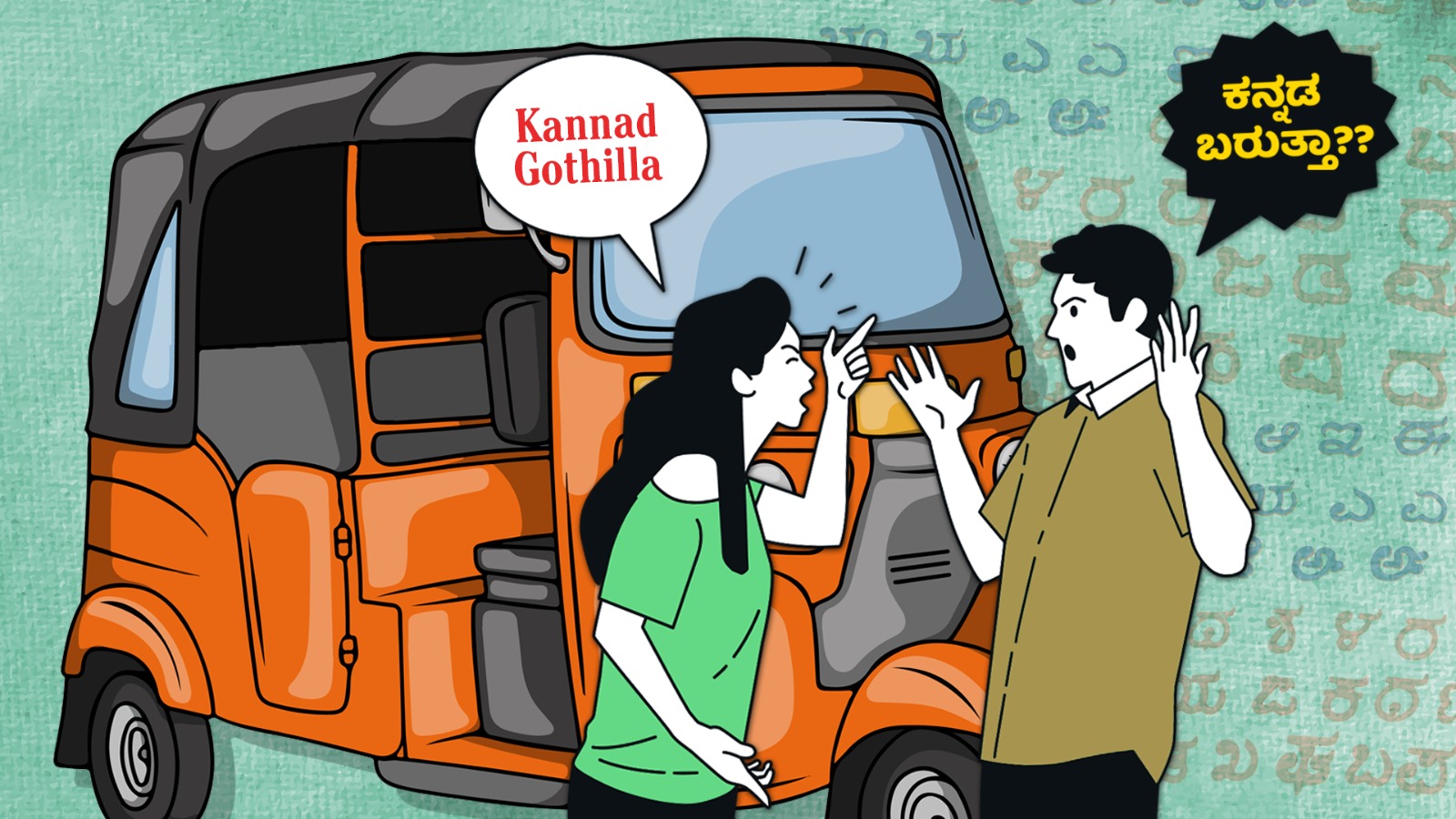
Bengaluru’s auto drivers, non-local techies and a Kannada lesson.
They have seen it all. The city, once a tranquil oasis of greenery with the moniker of Pensioners’ Paradise, grew into the bustling Silicon Valley of India before their eyes as they traversed the nook and corner of Bengaluru in their autorickshaws.
The autorickshaw drivers saw Bangalore becoming — or going back to — Bengaluru. They witnessed non-Kannadigas pouring in through Majestic, Kalasipalya, Madivala, and HAL Airport. The drivers picked up the visitors, who arrived in hordes and non-stop, seeking education and employment, and dropped them off at their destinations.
The visitors spoke different tongues, alien to the drivers, who responded through verbal and non-verbal modes to communicate.
The IT boom of the late 1990s and the liberalisation of the Indian economy breathed a new life into the otherwise laidback city with a pleasant year-round climate. Its skyline changed as more outsiders made it their home.
Many stayed back, some left seeking greener pastures. The auto drivers remained, as their vehicles once zoomed across the city, struggled to find space in the city’s bumper-to-bumper traffic.
Bengaluru’s growth was fast and startling. The cost of living increased as those in the economic lower strata, a majority of whom called the city their home for generations, struggled to keep pace with life. Though wealth trickled down, it fell short of meeting their aspirations. New problems cropped up along with swanky symbols of wealth as the city’s lakes shrunk. Effective communication was one of the problems.
Most new residents did not speak Kannada, as they interacted more with their colleagues or those with multiple language skills. The once ubiquitous “swalpa adjust maadi’ (please adjust a little) started losing its meaning and relevance as locals wanted newcomers to communicate with them in their language, Kannada.
With the imposition of Hindi in multiple official and unofficial forms — central government exams, schemes, banking services, alleged preferential hiring in IT companies, the factually incorrect assertion of it being ‘the national language’ — and instances of mocking Kannadigas and their language — online and offline, perceived attempts to disassociate Bengaluru from her linguistic identity has brought it all to a boiling point. The locals are not willing to swalpa adjust anymore.
Often, insistence on others to speak in Kannada led to friction and even grabbed headlines whenever the situation went out of hand. Pro-Kannada groups that took birth in the fringes gradually attracted many minds. Even as they went on a rampage, damaging property, they found support from those who justified the violence as ‘language pride’. They urged outsiders to speak Kannada — or leave Karnataka.
Autorickshaw drivers, who interact more with various people, too, wanted their customers to speak Kannada. The drivers, who serve as the backbone of the city’s transport system, saw the refusal of many non-Kannadigas to learn even basic Kannada not just as a minor inconvenience but a sign of disrespect towards the local culture.
While these drivers express frustration over linguistic barriers, non-Kannadiga residents, especially tech professionals offer a different perspective. They feel learning a language is a personal choice.
Some point to the difficulty of learning a new language as adults, while others cite external pressures that fuel the tension. As these conversations unfold, they reveal the complex dynamics of identity, communication, and respect in a city that thrives on its cultural diversity but grapples with the practicalities of daily life.
The cultural divide is now real. Though outsiders have opened up new opportunities, regional pride often pushes new livelihood opportunities into its shadow.
Autorickshaw drivers paint a vivid picture of everyday tensions that arise from linguistic barriers. They argue that learning Kannada is not just a matter of convenience but also respecting the city.
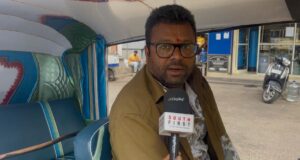
Autorickshaw driver Shankar appeals outsiders to learn basic Kannada. (South First)
“I face a lot of challenges with the passengers, especially non-Kannadigas. I do not know Hindi. If I reply in Kannada, they misread and become angry,” autorickshaw driver Shankar told South First.
“If we try to make them understand, they will abuse us. Bengaluru gives food to millions of people. It is good that even non-Kannadigas learn Kannada because it will help us to a great extent,” Shankar, who has been driving an auto for the past five years, said.
“The situation has become worse that a woman was seen claiming in a video that ‘if there are no North Indians then Bengaluru is nil’. It is wrong. These people have started to migrate to Bengaluru after it became an IT hub,” he added.
“We also earn a living and they also do the same. There should be mutual respect. If we say anything, they will make false allegations against us. There are only 10 to 15 percent outsiders that create nuisance and the rest are compatible,” Shankar added that even if non-Kannadigas leave Bengaluru, it won’t make any difference in their lives.
While the autorickshaw drivers acknowledge the contributions of non-Kannadigas, they believe that embracing Kannada would foster better relationships and daily interactions that define life in this rapidly growing metropolis.
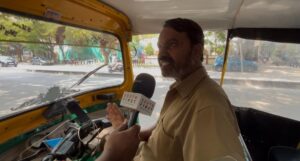
Autorickshaw Driver Srinivas urged outsiders to learn Kannada. (South First)
Autorickshaw driver Srinivas, who has been running an auto for the past 25 years in Bengaluru, has Telugu as his mother tongue. “But we speak Kannada at home and outside. I respect Kannada,” he said.
“Non-Kannadigas who are running businesses and working in hotels have learnt basic Kannada. However, over 70 percent are yet to learn the language,” he added.
“Whenever I try to communicate with outsiders in Kannada, they ask me if I speak Hindi. I ask them to learn Kannada,” he revealed how he is promoting the local language.
“They need jobs, water, and clothes from Karnataka but do not need Kannada. Local people shower us a lot of respect and behave well compared to outsiders, whereas outsiders are arrogant,” he claimed.
“They also complain against us over booking/cancellations of rides. I never compel them to leave Karnataka,” Srinivas said.
However, driver Rajakumar, operating in the city for the past 21 years, has not faced any issues. “I communicate in multiple languages including Hindi,” he revealed his secret.
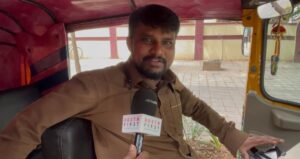
Autorickshaw driver Shivaraj stated that he communicates only in Kannada with the passengers. (South First)
“We can understand those who stay for a brief period do not speak Kannada. But those who have resided for over five to 10 years are reluctant to learn. They should learn basic Kannada,” Rajakumar added that it is wrong to ask them to leave Karnataka because “we are all Indians”.
Driver Shivaraj admitted that non-Kannadigas provide them with business. “But they have to learn Kannada,” he said, adding that he does not know any other language.
“They eat food from here. They should learn Kannada. Let them speak their language when they go to their hometown. But when in Karnataka, they must speak Kannada,” Shivaraj does not have a doubt.
Techie Dishali was on a tea break when South First caught up with her. She said friction with auto drivers is mostly overbooking rides.
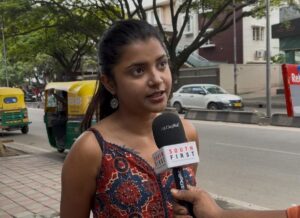
Dishali felt it is one’s personal choice to learn local language. (South First)
“Most drivers do not accept the ride due to traffic and distance. The booking process is a headache while dealing with auto drivers,” she said.
Dishali has not faced any issues over the language. “There are no safety concerns as of now. The clashes mostly happen because of booking rides, not over language,” she opined.
Though she could manage basic Kannada, Dishali felt learning the language now would be difficult.
“I understand basic Kannada but can’t speak. Most of us move to Bengaluru in our early 20s, and it is difficult to learn a new language. Outsiders must try to learn at least the basics of the local language because autorickshaw drivers will not have the same exposure as we do,” Dishali said, adding that learning a new language is a personal choice.
Rohit Patel, 25, has been residing in Bengaluru city since 2022. “I came to Bengaluru for studies and later settled here after getting a job as a web developer. Initially, I did not feel any language barrier or discrimination,” he said.
“The only time I had an issue was on a KSRTC bus when I had a miscommunication with the conductor due to the language,” Patel, who hails from Madhya Pradesh, recalled the minor altercation.
He has not faced any issues with auto drivers. “I use third-party apps to hail autos. They speak at least two languages. But I have felt bus conductors to be a bit negative towards North Indians,” he said.
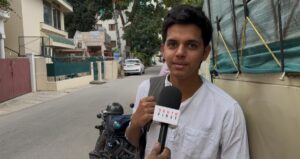
Techie Madhav said that he has started learning Kannada. (South First)
Patel was excited to learn Kannada when he first came to the city. “The excitement died when I started feeling that Kannada was being thrust upon me,” he said.
Social media has often amplified instances of North Indians being coerced into learning the language.
“I do not encourage Hindi imposition because not everyone speaks Hindi. Social media and politics fuelled the language debate in the past few years. It’s been always a dream to come and settle in a big city for their liberating values but issues like these hinder people from having dreams,” opined Patel.
Techie Madhav, who has been residing in Koramangala for the past six months, has not faced any issues with autorickshaw drivers. “Several people might have come from other states but in the end we all are Indians,” he said.
“It is good to learn Kannada. My mother is from Ballari and my father is from Andhra Pradesh. I understand and talk a little Kannada,” Madhav said.
(Edited by Majnu Babu)

